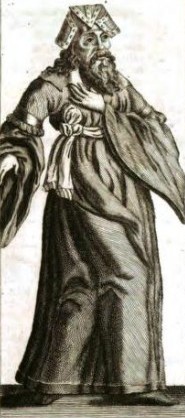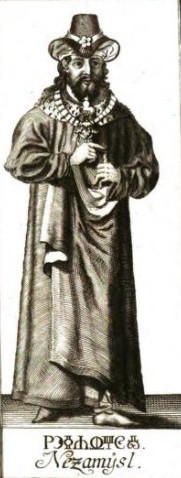|
Vnislav
Vnislav was the fourth of the seven Bohemian mythical princes between the (also mythical) founder of the Přemyslid dynasty Přemysl the Ploughman and the first historical prince Bořivoj. The names of the princes were first recorded in Cosmas chronicle and then transmitted into the most of historical books of the 19th century including František Palacký's ''The History of the Czech Nation in Bohemia and Moravia''. One theory about the number of the princes is propped on the frescoes on the walls of the Rotunda in Znojmo, Moravia but Anežka Merhautová claimed that the frescoes depict all the members of the Přemyslid dynasty including the Moravian junior princes. Origin of the name Vnislav's name is a typical Slavonic name ending in -slav (such as Wenceslas, Vladislav, Vítězslav Vítězslav () is a Czech given name. It may refer to: *Vítězslav Hálek (1835–1874), Czech writer * Karel Vítězslav Mašek (1865–1927), Czech artist * Vítězslav Novák (1870–1949 ... [...More Info...] [...Related Items...] OR: [Wikipedia] [Google] [Baidu] |
Přemyslid Dynasty
The Přemyslid dynasty or House of Přemyslid ( cs, Přemyslovci, german: Premysliden, pl, Przemyślidzi) was a Bohemian royal dynasty that reigned in the Duchy of Bohemia and later Kingdom of Bohemia and Margraviate of Moravia (9th century–1306), as well as in parts of Poland (including Silesia), Hungary and Austria. Origin and growth of the Přemyslid dynasty The dynasty's origin dates back to the 9th century, when the Přemyslids ruled a tiny territory around Prague, populated by a tribe of the Western Slavs. Gradually they expanded, conquering much of the region of Bohemia, located in the Bohemian basin where it was not threatened by the expansion of the Frankish Empire. The first historically-documented Přemyslid duke was Bořivoj I (867). In the following century, the Přemyslids also ruled over Silesia and founded the city of Wroclaw (Czech: ''Vratislav''; German: ''Breslau''), derived from the name of a Bohemian duke, Vratislaus I, father of Saint Wenceslaus. Under ... [...More Info...] [...Related Items...] OR: [Wikipedia] [Google] [Baidu] |
Hostivít
Hostivít was the last of the seven Bohemian mythical princes between the (also mythical) founder of the Přemyslid dynasty Přemysl the Ploughman and the first historical prince Bořivoj. The names of the princes were first recorded in the ''Chronicle of Cosmas'' and then transmitted into historical books of the 19th century including František Palacký's ''The History of the Czech Nation in Bohemia and Moravia''. According to tradition, he was the father of the non-legendary prince Bořivoj. Some historians suppose that when St. Ludmila was born, Hostivít (or Svatopluk I of Moravia) and Ludmila's father, Slavibor, contracted that Ludmilla would marry Bořivoj (which could refer to the wedding procession of an unknown bride mentioned in ''Annales Fuldenses'' for 871_. According to the ''Chronicle of Dalimil'', Hostivít had a brother called Děpolt who inherited the land of Kouřim. One theory about the number of the princes is propped on the frescoes on the walls of the Rot ... [...More Info...] [...Related Items...] OR: [Wikipedia] [Google] [Baidu] |
Neklan
Neklan was the sixth of the seven Bohemian mythical princes between the (also mythical) founder of the Přemyslid dynasty Přemysl the Ploughman and the first historical prince Bořivoj. The names of the princes were first recorded in Cosmas chronicle and then transmitted into the most of historical books of the 19th century including František Palacký's ''The History of the Czech Nation in Bohemia and Moravia''. According to the Chronicle of Dalimil, Neklan had two sons, Hostivít and Děpolt. One theory about the number of the princes is propped on the frescoes on the walls of the Rotunda in Znojmo, Moravia but Anežka Merhautová claimed that the frescoes depict all the members of the Přemyslid dynasty including the Moravian junior princes. Origin of the name Neklan's name is thought to be derived from the Slavonic word ''"klát"'' meaning ''to tilt'' and prefix ne- (''non'') so it describes him to be a peaceful ruler. Záviš Kalandra thought the names of the seven ... [...More Info...] [...Related Items...] OR: [Wikipedia] [Google] [Baidu] |
Křesomysl
Křesomysl was the fifth of the seven Bohemian mythical princes between the (also mythical) founder of the Přemyslid dynasty Přemysl the Ploughman and the first historical prince Bořivoj. The names of the princes were first recorded in Cosmas chronicle and then transmitted into most of the historical books of the 19th century including František Palacký's ''The History of the Czech Nation in Bohemia and Moravia''. One theory about the number of the princes is propped on the frescoes on the walls of the Rotunda in Znojmo, Moravia but Anežka Merhautová claimed that the frescoes depict all the members of the Přemyslid dynasty including the Moravian junior princes. Origin of the name Křesomysl's name is thought to be derived from the old Slavonic words ''"křesat"'' meaning ''to strike a light'' and ''"mysl"'' meaning ''mind'' or ''spirit'' thus literally the name should have meant ''"lighting the mind"''. The suffix ''-mysl'' is also in the other mythical names Přemysl ... [...More Info...] [...Related Items...] OR: [Wikipedia] [Google] [Baidu] |
Vojen
Vojen was the third of the seven Bohemian mythical princes between the (also mythical) founder of the Přemyslid dynasty Přemysl the Ploughman and the first historical prince Bořivoj. The names of the princes were first recorded in Cosmas chronicle and then transmitted into the most of historical books of the 19th century including František Palacký's ''The History of the Czech Nation in Bohemia and Moravia''. One theory about the number of the princes is propped on the frescoes on the walls of the Rotunda in Znojmo, Moravia but Anežka Merhautová claimed that the frescoes depict all the members of the Přemyslid dynasty including the Moravian junior princes. Origin of the name Vojen's name is thought to be derived from the Slavonic word ''"vojna"'' meaning ''war''. Záviš Kalandra thought the names of the seven princes were cryptical names of ancient Slavonic days of the week - Vojen being the third - Tuesday, in Latin ''Martis dies'' whereas Mars Mars ... [...More Info...] [...Related Items...] OR: [Wikipedia] [Google] [Baidu] |
Mnata
Mnata was the second of the seven Bohemian mythical princes between the (also mythical) founder of the Přemyslid dynasty Přemysl, the Ploughman and the first historical prince Bořivoj. The names of the princes were first recorded in Cosmas chronicle and then transmitted into the most of historical books of the 19th century including František Palacký's ''The History of the Czech Nation in Bohemia and Moravia''. One theory about the number of the princes is propped on the frescoes on the walls of the Rotunda in Znojmo, Moravia but Anežka Merhautová claimed that the frescoes depict all the members of the Přemyslid dynasty including the Moravian junior princes. Origin of the name Mnata's name is thought to be derived from the Czech word "mníti" - remember. Záviš Kalandra thought the names of the seven princes were cryptical names of ancient Slavonic days of the week - Mnata being the second - Monday similar to German ''Montag''. Another theory says that the names w ... [...More Info...] [...Related Items...] OR: [Wikipedia] [Google] [Baidu] |
Nezamysl
Nezamysl was the first of the seven Bohemian mythical princes between the (also mythical) founder of the Přemyslid dynasty Přemysl the Ploughman and the first historical prince Bořivoj. The names of the princes were first recorded in Cosmas chronicle and then transmitted into most historical works up into the 19th century, including František Palacký's ''The History of the Czech Nation in Bohemia and Moravia'' (1836). One theory connects the number of princes to the frescoes on the "Ducal Rotunda" of the Virgin Mary and St Catherine in Znojmo, Moravia, which date back to the late 11th or early 12th century. However, Anežka Merhautová suggested that the frescoes depict all the members of the Přemyslid dynasty including the Moravian junior princes at the time when it was painted, rather than a Přemyslid pedigree. Origin of the name Nezamysl's name is thought to be derived from the opposite meaning to Přemysl - "not thinking", cf. Roman "Simplicius". Záviš Kalan ... [...More Info...] [...Related Items...] OR: [Wikipedia] [Google] [Baidu] |
Václav
Václav () is a Czech male first name of Slavic origin, sometimes translated into English as Wenceslaus or Wenceslas. These forms are derived from the old Slavic/Czech form of this name: Venceslav. Nicknames are: Vašek, Vašík, Venca, Venda For etymology and cognates in other languages, see Wenceslaus. Václav or Vácslav * Saint Wenceslaus I, Duke of Bohemia (907–935 or 929) (svatý Václav) * Václav Noid Bárta, singer, songwriter, and actor * Václav Binovec, Czech film director and screenwriter * Václav Brožík, painter * Václav Hanka, philologist * Václav Havel, last President of Czechoslovakia (1989 – 1992) and first President of the Czech Republic (1993 – 2003) * Václav Holek, Designer of the ZB-26 light machinegun for Zbrojovka Brno and its descendants * Václav Hollar, graphic artist * Vaclav Jelinek, a Czechoslovak spy, who worked in London under the assumed identity of Erwin van Haarlem * Václav Jiráček, Czech actor * Václav Jírů, Czech phot ... [...More Info...] [...Related Items...] OR: [Wikipedia] [Google] [Baidu] |
Záviš Kalandra
Záviš Kalandra (10 November 1902 – 27 June 1950) was a Czechoslovak historian, theatre critic and theorist of literature. He was born in Frenštát pod Radhoštěm. He studied philosophy at the Charles University in Prague and then in Berlin. In 1923 he joined the Communist Party of Czechoslovakia, but he was expelled due to his criticism of Stalin's policy. Kalandra criticized the Moscow Trials of 1936 and was expelled from the Communist Party. He was arrested by the Gestapo in 1939 and imprisoned until 1945 in various concentration camps. After the war he was branded as a Trotskyist and accused of being the member of a supposed plot to overthrow the Communist regime. He was sentenced to death along with his co-defendants, Milada Horáková Milada Horáková (née Králová, 25 December 1901 – 27 June 1950) was a Czech politician and a member of underground resistance movement during World War II. She was a victim of judicial murder, convicted and executed by the nat ... [...More Info...] [...Related Items...] OR: [Wikipedia] [Google] [Baidu] |
Vítězslav
Vítězslav () is a Czech given name. It may refer to: *Vítězslav Hálek (1835–1874), Czech writer * Karel Vítězslav Mašek (1865–1927), Czech artist *Vítězslav Novák (1870–1949), Czech composer * Ludvík Vítězslav Čelanský (1870–1931), Czech conductor and composer *Vítězslav Nezval (1900–1958), Czech avant-garde writer *Vítězslav Lederer (1904–1972), known for escaping from Auschwitz in 1944 * Vítězslav Pavlousek (born 1911), Czech sailor * Vítězslav Hloušek (born 1914), Czech basketball player * Vítězslav Lahr (born 1929), Czech skier * Vítězslav Svozil (born 1933), Czech swimmer * Vítězslav Országh (born 1943), Czech weightlifter * Vítězslav Mácha (born 1948), Czech wrestler * Vítězslav Ďuriš (born 1954), Czechoslovak ice hockey player * Vítězslav Jureček (born 1960), Czech biathlete *Vítězslav Lavička Vítězslav Lavička (; born 30 April 1963) is a Czech football manager and former player. Playing career As a player, Lavi ... [...More Info...] [...Related Items...] OR: [Wikipedia] [Google] [Baidu] |
Vladislav
Vladislav ( be, Уладзіслаў (', '); pl, Władysław, ; Russian, Ukrainian, Bulgarian, Macedonian, sh-Cyrl, Владислав) is a male given name of Slavic origin. Variations include ''Volodislav'', ''Vlastislav'' and ''Vlaslav''. In the Czech Republic, Slovakia and Croatia, the common variation is Ladislav. Outside of Slavic and Eastern Romance countries, it is sometimes latinized as either ''Vladislaus'' or ''Vladislas''. Spanish forms include ''Ladislao'' and ''Uladislao''. The Portuguese and Romanian forms are ''Ladislau''. The Hungarian form is László. In Russian-speaking countries, it is usually colloquially shortened to either ''Vlad'' (Влад) or ''Vladik'' (Владик). The feminine form of the name Vladislav is Vladislava or, in Polish spelling, ''Władysława''. Origin The name Vladislav literally means 'one who owns a glory', or simply 'famous'. It is a composite name derived from two Slavic roots: ''Vlad-'', meaning either 'to own' (Ukrai ... [...More Info...] [...Related Items...] OR: [Wikipedia] [Google] [Baidu] |




.jpg)